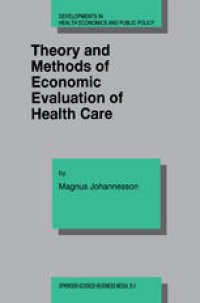
Ebook: Theory and Methods of Economic Evaluation of Health Care
Author: Magnus Johannesson (auth.)
- Tags: Microeconomics, Economic Policy, Public Health
- Series: Developments in Health Economics and Public Policy 4
- Year: 1996
- Publisher: Springer US
- Edition: 1
- Language: English
- pdf
Most economic evaluations of health care programmes at the moment are cost effectiveness and cost-utility analyses. The problem with these methods is that their theoretical foundations are unclear. This has led to confusion about how to define the costs and health effects and how to interpret the results of these studies. In the environmental and traffic safety fields it is instead common to carry out traditional cost-bene:fit analyses of health improving programmes. This striking difference in how health programmes are assessed in different fields was the original motivation for writing this book. The aim of the book is to tty and provide a coherent framework within cost-bene:fit analysis and welfare economics for the different methods of economic evaluation in the health care field. The book is written in an easily accessible manner and several examples of applications of the different methods are provided. It is my hope that it will be useful both for teaching purposes and as a guide for practitioners in the field. Glenn C. Blomquist, John D. Graham, Rich O'Conor and four anonymous referees provided helpful comments on previous versions of the manuscript. I would also like to express my gratitude to the following persons for helping me to prepare the manuscript: Carl-Magnus Berglund, Carin Blanksvard, Ann Brown, and Ziad Obeid.
This volume describes the theory and methods of economic evaluation of health care. Currently, most economic evaluations of health care programs are cost-effectiveness and cost-utility analyses, while in the environmental and traffic safety fields it is common to carry out instead traditional cost-benefit analysis of health improving programs. This striking difference in how health programs are assessed in different fields was the original motivation for writing this book.
Theory and Methods of Economic Evaluation of Health Care shows how the costs and benefits of health care programs can be defined and measured using welfare economic theory. Also, considerable attention is devoted to cost-effectiveness and cost-utility analysis where the health effects are measured in non-monetary units, thus providing a unifying cost-benefit framework for all methods of economic evaluation. Finally, the problems and potentials of using economic evaluation in policy making are also discussed.
The book is written in an easily accessible manner and provides numerous examples of applications of the different methods. It will be an invaluable source for both instructors and practitioners in the health care field.